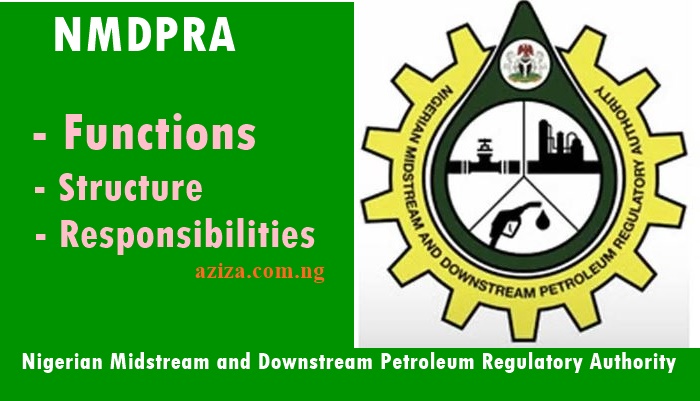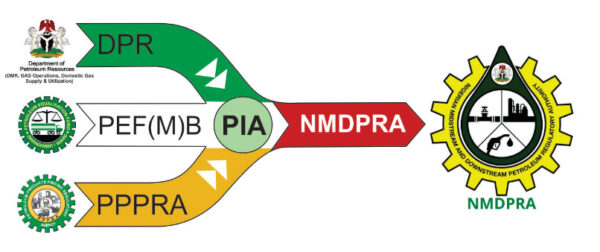The Nigerian Midstream and Downstream Petroleum Regulatory Authority (NMDPRA) was created in September 2021 in line with the Petroleum Industry Act (PIA) 2021 which seeks to provide legal, governance, regulatory and fiscal framework for the Nigerian Petroleum Industry and development of Host Communities.
The Nigerian Midstream and Downstream Petroleum Regulatory Authority (NMDPRA) is responsible for the technical and commercial regulation of the midstream and downstream operations in Nigeria. With the scrapping of three hitherto extant oil regulatory agencies: Department of Petroleum Resources (DPR), Petroleum Products Pricing Regulatory Agency (PPPRA) and Petroleum Equalization Fund (PEF), The NMDPRA was birthed to a new dawn with the key objective to establish a progressive fiscal framework that encourages investment in the Nigerian petroleum industry, provides clarity, enhances revenues for the government while ensuring a fair return for investors.
Read: Consultation Service in Nigerian Oil & Gas
Petroleum Industry Act (PIA) 2021 overhauled the regulation and governance of the oil and gas industry and provided for two regulatory agencies—the Nigerian Upstream Petroleum Regulatory Commission (NUPRC) and the Nigerian Midstream and Downstream Petroleum Regulatory Authority (NMDPRA). Each of them is responsible for the technical and commercial regulation of petroleum operations in their respective sectors, and have the power to acquire, hold, and dispose of property, as well as sue and be sued in their own name.
Note: the NMDPRA’s functions are limited to Nigerian Midstream and Downstream regulations.
NMDPRA Specialties
Downstream, Midstream, Gas Infrastructure, Depots & Storage, Products Importation & Refining, Open Access Common Carrier, Health, Safety & Environment, Guidelines & Policies, Licensing & Regulations, Standards & Compliance, Cost Benchmarks, Tariff and Pricing Frameworks, Supply, Distribution and Marketing, Code of Conduct, and Industry Statistics & Reports.
Read: NOGIC JQS Certificate Registration
Functions
- Regulate and monitor midstream and downstream operations in Nigeria.
- Determine appropriate tariff methodology.
- Set cost benchmarks for midstream and downstream operations.
- Advise the Government and stakeholders on commercial matters relating tariff and pricing framework.
- Regulate the bulk storage, distribution, marketing, transportation pipelines of petroleum products.
- Monitor and enforce compliance with the terms and conditions of licenses, permits, and authorizations issued by the authority.
- Set, define, and enforce approved standards and regulations for design, construction, fabrication, operation, maintenance of plants, installations, and facilities used or to be used in midstream and downstream petroleum operations.
- Ensure security of supply, development of the market and competition in the natural gas and petroleum products market.
- Establish customer protection measures in accordance with the provisions of the enabling Act.
- Promote competition and private sector participation in midstream and downstream petroleum operations.
Read: How to Start Business as a Foreigner
Key Activities of NMDPRA
- Stock and Product Sufficiency Report
- AQUILA Marketers’ Portal
- Retail Outlet monitoring System (ROMS)
- LPG Depot License
- Depot License
- Downstream Remote Monitoring System (DRMS)/E-Station
- Lube Oil Blending Plant (LOBP)
- Refining Plant License (RPL)
- Lube Storage and Sales License (LSSL)
- Petroleum Product Import and Export Permit system (IMPEX)
- Crude Oil Terminal Export Permit (COTEX)
- CNG Compression License
- LPG Plant License
- LPG Retailer (CAT D) License
- IMPEX Gas Permit
- Gas Terminal Export Portal (GATEX)
- Network Code Electronic Licensing and Administrative System NCELAS
- AGS (contains Auto Gas, Add-ons, industrial storage and utilization, truck tankers)
- Minimum Industry Safety Training for Downstream Operations (MISTDO)
- Coastal Vessel License (CVL)
- Daily Truck Out Report
- Refinery & Hydrocarbon Processing Plants (HPP)
- Pipeline Information Management System (PIMS)


